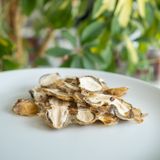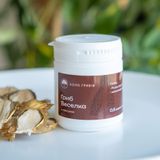The Impact of Phallus impudicus Mushroom on Cancer
The Phallus impudicus mushroom is an intriguing subject of scientific research due to its medicinal properties, particularly in the fight against cancer. In 2016, a team of scientists from India conducted a study published in the journal MicroMedicine titled “Immunopharmacological evaluation of Phallus impudicus against specific protein antigen.” This study explored the effects of the Phallus impudicus mushroom on the immune system and its potential in combating cancer.
The study used extracts and proteins from the Phallus impudicus mushroom to examine its effects on various parts of the immune system, and it was conducted on mice. During the experiment, it was discovered that this mushroom contains low-molecular-weight compounds that can interact with signaling pathways in the body, particularly those responsible for inflammation and the fight against cancer cells.
Mechanisms of Action
The primary active components of the Phallus impudicus mushroom identified in the study include proteins and other bioactive compounds that stimulate the body's immune response. One of the most important aspects of Phallus impudicus' action is its ability to stimulate the production of cytokines such as TNF-alpha (tumor necrosis factor-alpha, which plays a crucial role in inflammation and tumor suppression) and IL-4 (interleukin-4, a regulator of immune response).
Overall, the study showed that the application of the Phallus impudicus extract leads to a significant enhancement of the immune response. The key mechanism by which Phallus impudicus helps in the fight against cancer lies in its ability to stimulate the production of TNF-alpha. This cytokine induces inflammatory processes within tumors, ultimately destroying their blood vessels and blocking blood flow to the tumor, leading to its death. Specifically, scientists recorded that after applying a solution of Phallus impudicus extract and protein, TNF-alpha levels increased by 150% compared to the control group, which led to partial destruction of tumor cells in the test animals.
Another Study
Another study on animals, conducted by Kadukova et al. (2010), demonstrated that the Phallus impudicus extract inhibited tumor growth rates, reduced tumor volumes, and increased the effectiveness of cyclophosphamide in mice with adenocarcinoma. In some cases, when the extract was combined with the chemotherapy drug cyclophosphamide, nearly complete tumor regression was observed in 25% of the animals.
Clinical Trials on Humans
There are also results from another long-term clinical study on humans, conducted in Latvia from 1991 to 2005 (Kuznetsova et al., 2006). More than twenty-five thousand cancer patients with various types of cancer participated, 11,475 of whom used Phallus impudicus (Phallus impudicus). In this non-randomized paired study, it was found that the life expectancy of patients who used the Phallus impudicus mushroom extract was longer for all types of cancer. Life expectancy was approximately 52% longer than that of the control group.
The Phallus impudicus mushroom possesses potential anti-tumor properties through the stimulation of TNF-alpha, which may contribute to the destruction of cancer cells. Although Phallus impudicus is not a cure-all, it can become an important aid in strengthening the immune system, and its use in combination with other treatments may help improve immune response and prevent the development of cancer.
Do not abandon proper medical treatment and consult with your doctor. Take responsibility for your health and stay well!
For each client individually, we draw up instructions according to his indicators and requests
Monthly Course:
- Phallus whole 100 g - $30
- Phallus caps 120 capsules - $30
- Extract of Phallus caps 90 capsules - $46
Other articles on the topic:
- What is the difference between dried mushroom and extract?
- Phallus impudicus. Myths about Treating Male Fertility
Contact us:
















































